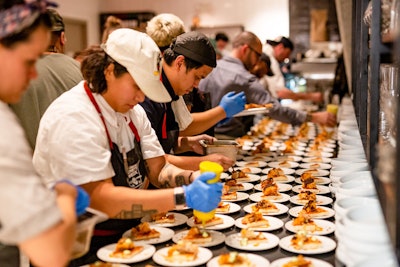
Who doesn’t love a food festival? They’re a great way to learn about new restaurants and sample a variety of cuisine. But there’s a darker side to the events, which, when mismanaged, can be financially exploitative to restaurants and responsible for mass food waste.
Indie Chefs Community (ICC)—a group that aims to improve the lives of people in the hospitality industry—is hoping to change that with COMMUNE, a new food festival coming to Houston from Aug. 21 to Sept. 5. The event’s goals? To be equitable, to give back to the community, to champion social justice and to address systemic issues facing the hospitality industry. (Oh, and to serve delicious food.)
Sounds like a lofty agenda—but Grover Smith, the founder of Indie Chefs Community, is ready for it. The community has already hosted more than 40 activations, bringing together more than 700 chefs across 13 cities around the country. For COMMUNE, the group’s largest event yet, the team will host more than 200 chefs over two weeks. The event, which organizers call an “experiential dining compound,” will also include pop-ups, collaborative dinners, classes, roundtable discussions, a street market and more.
Speaking from his own experience, Smith says, “There has been a trend toward for-profit festivals asking more and more from the participants while providing less in value or support. You see some of the marquee festivals asking chefs to come at their own expense, provide the product and labor used to make the food at their expense, and on top of it, they don’t set them up for success—they’re in a tent serving hundreds or even thousands of portions of lukewarm or cold food in paper boats to an oversold event that basically turns into a cattle call.”
Smith also notes that more diverse chefs are often overlooked by festival organizers in favor of more well-known celebrity chefs who drive ticket sales. “We wanted to figure out a financial model and operation that allowed us to do it in a more equitable way,” he explains. “We found places we could cut costs that didn’t impact the experience, and instead put those dollars toward the chef and their participation costs, the guest-facing experiential elements that help sell tickets, and even paying some smaller restaurants to close so they could participate and not be negatively impacted.” Organizers call COMMUNE an “experiential dining compound”; the festival will include pop-ups, collaborative dinners, classes, roundtable discussions, a street market and more. Rendering: Courtesy of Indie Chefs Community
Organizers call COMMUNE an “experiential dining compound”; the festival will include pop-ups, collaborative dinners, classes, roundtable discussions, a street market and more. Rendering: Courtesy of Indie Chefs Community
Here are some steps the team is taking to make the food festival as equitable and inclusive as possible:
1. Covering all chef costs for participation, including travel, lodging and food costs.
This is something the ICC has done for every event since its inception, notes Smith. It’s paid for by a combination of partners, benefactors and ticket sales. But, he adds, “We believed in the idea so we personally underwrote the startup costs, which are by no means insignificant.”
He continues, “We’ve spent years cultivating trust and relationships doing our other series and because of those bonds, we have 150-plus chefs that are willing to not only participate as the talent but take part in the actual running of the event. It truly is a collaborative effort by us and the chefs, and that’s what makes it so special to me personally. If you want something done quickly and efficiently, just ask someone with a hospitality background.”
2. Offering a rev-share model for restauranteurs who are hosting marquee events.
The goal is to make up for them having to close their establishments for a full day to allow staffers to participate in the festival.
3. Donating 50% of net proceeds of all sales from the first week to Chefs Stopping AAPI Hate.
The nonprofit was chosen because Smith is close friends with the founders, Tim Ma and Kevin Tien. “I believe in their mission and I’m disgusted by the rise in xenophobia and hate crimes directed toward the AAPI community,” he explains. “I wanted to do something to help, and this was what we settled on. We have more ways we’re going to support them in the works.”
4. Spotlighting a diverse range of talent.
For example, 45% of COMMUNE’s chefs self-identify as women, and 40% self-identify as BIPOC. “It’s a true representation of those that work in our kitchens in America,” Smith notes. “Additionally, American cuisine and all of its offshoots are completely rooted in different cuisines from around the world and 'our' food in America is just a mash-up. Even Southern food, which many equate to uniquely American, is completely derived from the cuisines of Africa.”
He adds, “Our entire community is based on referrals by past participants in good standing, which has served us well for the most part.”
Smith thinks that 2021 was exactly the right moment to tackle the ICC’s biggest event yet. “Interest by the chef community was overwhelming. We’ve been dying to get together for over 15 months,” he says, adding that all talent, sponsors, staff and volunteers at COMMUNE will be fully vaccinated. “I had waited as long as possible to plan anything until I felt the vaccines had proven their efficacy and were widely available.” Smith also purposely chose an outdoor venue, considered to be the safest way to host a large-scale gathering during the pandemic.
As for what advice he would offer other food festival organizers trying to build more equitable events? “Don’t be lazy about invites and do the easy thing,” Smith suggests. “Lean into asking your local food community about the hidden gems and family-owned operations that may not be well known now, but do things the right way and serve incredible food. Do your due diligence on people’s backgrounds and how they treat their staff and guests.”
He continues, “Hospitality is a very community-driven industry. You’d be surprised what you can discover if you just ask the right questions.”



















